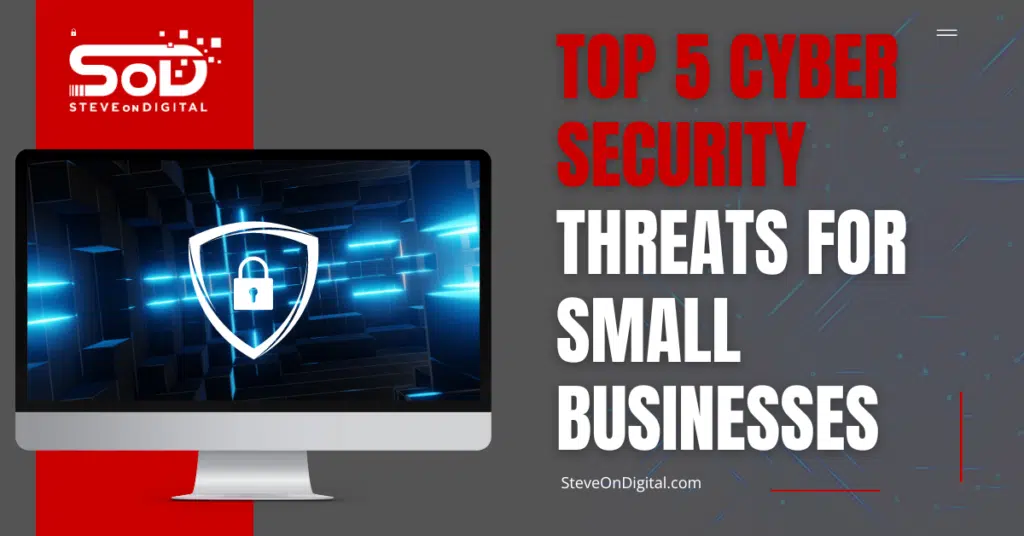Top 5 Cyber Security Threats For Small Businesses – SteveOnDigital

Hello there, I’m Steve Johnston, and I run SteveOnDigital. Today, we’re diving into a topic that’s close to my heart and crucial for the livelihood of small businesses: cyber security. As someone who’s navigated the choppy waters of digital threats firsthand, I’ve seen the impact that cyber incidents can have on businesses just like mine and perhaps yours. Why Is Cyber Security Essential? For us, the owners of small businesses, cyber security isn’t just a buzzword—it’s a crucial shield. It protects everything from our customer data to our business reputation. Small businesses are increasingly targeted by cyber criminals. Unlike large enterprises, we often lack the vast resources necessary to rebound quickly from a cyber attack. Defining The Basics Why Cyber Security Matters For Small Businesses Impact On Operational Integrity And Reputation In my experience, a single cyber breach can not only disrupt operations but also severely damage a business’s reputation. We’re in an era where customers expect their data to be handled with the highest level of security. A breach can lead to a loss of trust that’s hard to rebuild. For example, after a minor incident where suspicious activity was detected on our network, we had to work double-time to reassure our clients that their information remained safe. This was a wake-up call to strengthen our defenses, an investment that has paid dividends in customer trust and business resilience. Protecting Critical And Sensitive Data For small businesses like ours, the data we hold—be it customer details, financial information, or proprietary business knowledge—is critical. This data is not just sensitive; it’s the lifeblood of our business strategy and operations. Protecting this data is not merely a technical requirement but a core business strategy. The Growing Threat Landscape For Small Businesses In the digital age, the threat landscape for small businesses like mine—and possibly yours—is not just growing; it’s evolving rapidly. Running SteveOnDigital has taught me that staying ahead of cyber threats isn’t just about keeping the lights on; it’s about protecting our future. Cyber Threats Are On The Rise It’s alarming but true: small businesses are increasingly targeted by cyber criminals. According to a recent report, small businesses make up 43% of cyber attack victims, and these incidents are on the rise. Why? Because we often lack the cybersecurity infrastructure of larger enterprises, making us softer targets. Real-World Impact Let me share a quick story. A fellow small business owner I know suffered a major ransomware attack last year. Hackers locked him out of his own systems and demanded a ransom that nearly crippled his business financially. It was a harsh reminder of how real and immediate these threats are. Evolving Methods Cyber criminals are not just sticking to old tricks; they’re innovating. Phishing scams, for instance, have evolved from poorly written emails to sophisticated schemes like Business Email Compromise (BEC), targeting companies just like ours to steal sensitive information or funds. The Importance Of Proactive Security Measures In combating cyber threats, the difference between a proactive and reactive approach can be the difference between a secure business and a disastrous breach. Proactive Vs. Reactive A reactive strategy often means scrambling after an attack has already occurred. On the other hand, a proactive approach involves preparing and strengthening your defenses before an attack happens. From my experience, the latter not only saves money in the long run but also spares you the headache of dealing with the aftermath of a security breach. Implementing Early Security Measures Investing in robust security measures early on is crucial. For instance, implementing multi-factor authentication across all user accounts in your organization can significantly reduce the risk of unauthorized access. At SteveOnDigital, we adopted multi-factor authentication early, which has thwarted several attempted breaches. Let’s talk about antivirus software and patch management—two critical components of a proactive cybersecurity strategy. Keeping your operating system and applications up to date can protect you from many known vulnerabilities that cyber criminals exploit. Moreover, installing reliable antivirus software provides an additional layer of defense, catching malicious software before it can do harm. The Benefits Are Clear The benefits of adopting a proactive cybersecurity approach are clear and powerful. It not only protects your critical and sensitive data but also preserves your business’s reputation and builds trust with your customers. When clients know that you take their data security seriously, they are more likely to remain loyal and advocate for your services. The Top Five Cyber Security Threats Facing Small Businesses As a small business owner and the guiding force behind SteveOnDigital, I’ve seen firsthand the devastating effects that cyber threats can pose. Based on my experiences and extensive research, here’s an outline of the top five cyber security threats that small businesses like ours need to be aware of. Threat Type Common Targets Potential Impact Phishing Attacks User Credentials, Sensitive Information Data breaches, financial loss Malware and Ransomware Operating Systems, Critical Data Operational disruption, ransom payments Weak Passwords User Accounts, Company Data Unauthorized access, data theft Unsecured Networks Entire Network Systems Data interception, malicious access Insider Threats Confidential Information, Sensitive Data Data leaks, sabotage Phishing Attacks What Are Phishing Attacks? Phishing attacks are attempts by cyber criminals to trick individuals into giving away sensitive information—such as passwords, company data, or banking information—through deceptive emails or messages. These attacks often disguise themselves as legitimate requests from trusted entities. Impact On Customer And Sensitive Data When phishing attacks succeed, the effects can be catastrophic. Cyber criminals can gain access to confidential information, leading to data breaches that not only threaten our financial stability but also compromise our customer’s trust. In my own journey, adopting stringent security measures was pivotal after a phishing scam nearly jeopardized our client data. Phishing Tactics Targeting Small Businesses One particularly sinister tactic is the Business Email Compromise (BEC). Here, attackers pose as company executives or partners to request money transfers or sensitive data. This method is becoming alarmingly sophisticated, often bypassing traditional security measures due to its deceptive nature. Strategies For Protection To defend against phishing:

